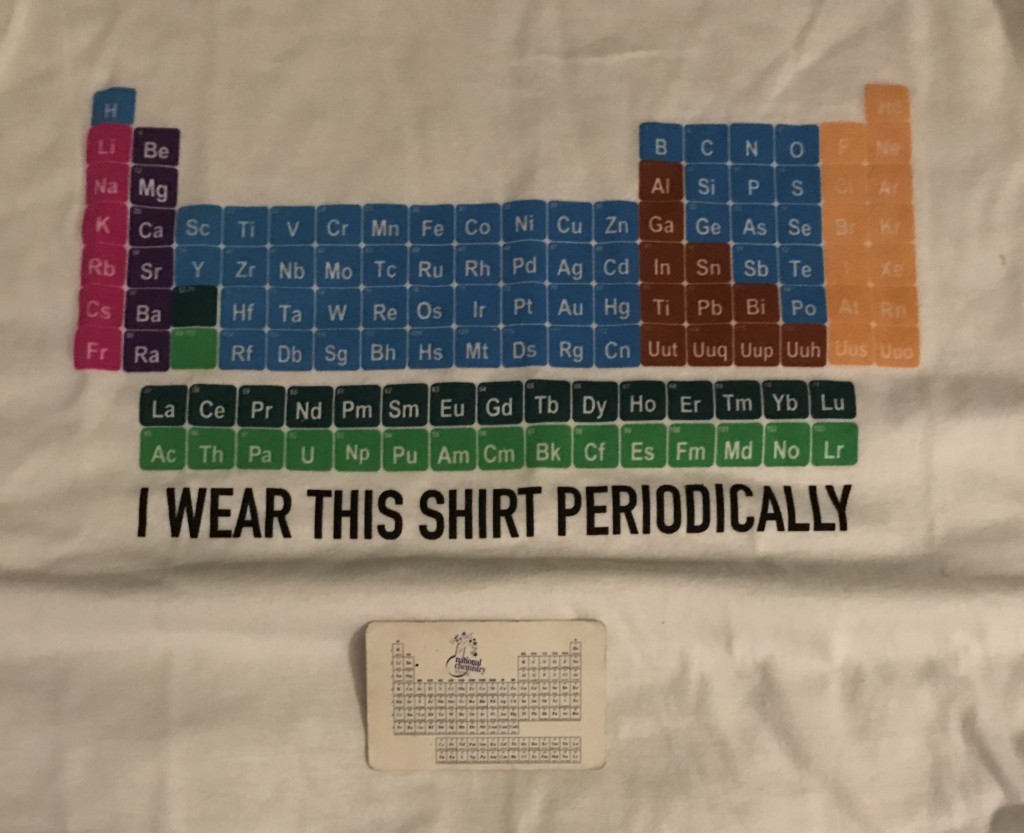I am a self-proclaimed nerd. Jeopardy, Trivial Pursuit, NOVA. These are my jam. Random fact: I carry a credit card sized periodic table of the elements in my purse. I got it in chemistry class on Mole Day (October 23 for those who are not fans of Avogadro’s Number) nearly 20 years ago. It’s older than my bank account.

I have always enjoyed math and science, and I don’t think I have ever been “ashamed” of being a mathlete. I still enjoy learning, whether it’s from an NPR podcast, reading the newspaper, or keeping up to date on labor laws. I know, some of those sound way more interesting than others. I find it surprising, and somewhat disappointing then, that I didn’t end up working in a STEM-related field. It’s not disappointing because I don’t find my work rewarding and challenging. In fact, because I naturally prefer a world where 1 + 1 always equals 2, the gray world of HR challenges my natural tendencies and pushes me out of my normal comfort zone.
Hindsight being 20/20, I am disappointed because of why I didn’t pursue a STEM field. It’s not because I thought it would be all boys. Heck, that probably would have been an advantage in my personal life! I was scared of the hard work. Calculus was a rough go for me in high school, and I assumed that all of Engineering would be like that. Guess what? It’s not. I prioritized maintaining a GPA over giving STEM a shot. Guess what else? As an adult who hires other adults, I know that GPA matters not. I won’t say I regret that I am not an Engineer today. Regret is too strong a word. I think saying that I am disappointed in myself. I am happy with my career, and I am good at what I do, so this might be surprising to people who know me.
Why am I telling you all of this on Pi Day? Well, it’s to cue up a discussion about how important it is to continue to expose our kids, especially girls, to STEM-related fields. AND to make sure that we don’t let them fear hard work. Life is hard work, but that’s another post entirely. How do I suggest we do this?
Praise hard work and perseverance as much as you do being smart. This means that when my daughter FINALLY figures out a puzzle, I might something like, “you are such a hard worker” instead of “you are so smart.” While I think both are true, one indicates that her effort was worth it, and that’s important.
Keep abreast of STEM fields. You know what wasn’t a prevalent field in yesteryear? Computer engineering. Now companies are in a war over talent in fields like coding, programming, and networking. Check out Girls Who Code for more. What’s the next big STEM field? Maybe it’s going to be related to autonomous driving or virtual reality or space travel.
Encourage kids to pursue STEM fields. If your child shows a penchant for digging up worms, give them a book on bugs. Watch shows like Bill Nye and the Magic School Bus. Go see movies like Hidden Figures. Read with them. Teach them about famous inventors and scientists, especially women. For inspiration, check out Marie Curie, Sally Ride, Dian Fossey, Sheryl Sandberg, Gertrude Elion, and Barbara McClintock, just to name a few.
Let them learn how to problem solve. This one is particularly hard for us as parents. My toddler has just recently reached the “I do it!” phase, so she is a regular reminder for me, but with the older girls, it can be hard. I just want to make their lives easier when they face a challenge, but that might not be the best approach. Even with the older kids, I have to remember the mantra of “I do it!” How else can you encourage problem solving? Try Odyssey of the Mind through school, take them to a family night out at an Escape Room, or even (Gasp! Screen time.) try one of the online games through PBS Kids.
Celebrate Pi Day, of course. Pizza Pie. Apple Pie. The options are delicious and plentiful. You can also observe Fibonacci Sequence Day on 11/23, Mole Day (10/23), Pythagorean Theorem Day (next will be 12/16/2020), or a bunch of others.
If all else fails, as they get older, appeal to their sense of greed. High demand fields = higher salaries when students enter the job market. Yep, superficial, but it’s true. And money can be a great motivator. If you don’t think so, try offering your kids an allowance in exchange for doing chores.
What other ways can we encourage our kids to pursue STEM fields? Anything I missed? Sound off in the comments!










